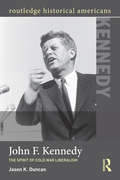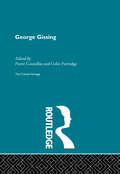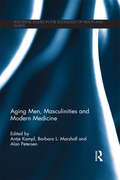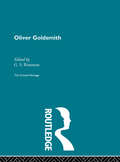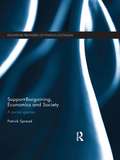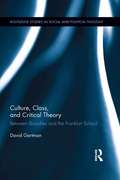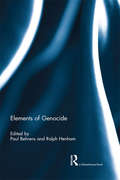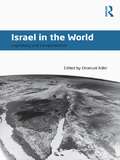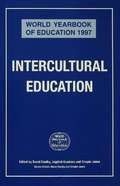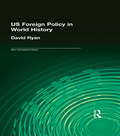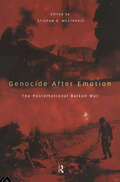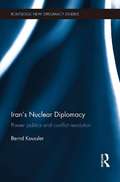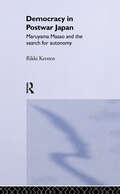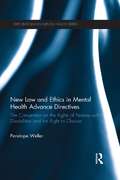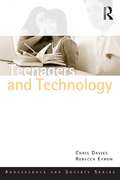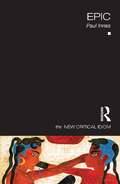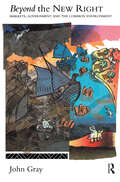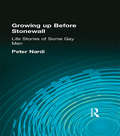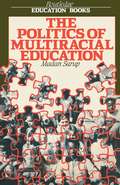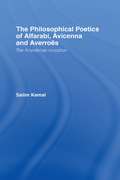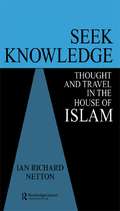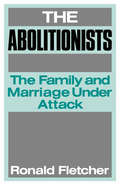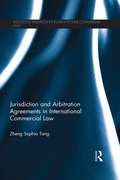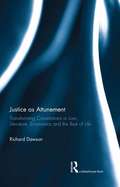Special Collections
Benetech’s Global Certified Accessible Titles
Description: Benetech’s GCA program is the first independent third-party EPUB certification to verify ebook accessibility. By creating content that is born accessible, publishers can meet the needs of all readers. Learn more: https://bornaccessible.benetech.org/
- Table View
- List View
John F. Kennedy
by Jason K. DuncanHalf a century after his assassination, John F. Kennedy continues to evoke widespread fascination, looming large in America’s historical memory. Popular portrayals often show Kennedy as a mythic, heroic figure, but these depictions can obscure the details of the president’s actual achievements and challenges. Despite the short length of his time in office, during his presidency, Kennedy dealt with many of the issues that would come to define the 1960s, including the burgeoning Cold War and the growing Civil Rights movement. In John F. Kennedy: The Spirit of Cold War Liberalism, Jason K. Duncan explains Kennedy’s significance as a political figure of the 20th century in U.S. and world history. Duncan contextualizes Kennedy’s political career through his personal life and addresses the legacy the president left behind. In a concise narrative supplemented by primary documents, including presidential speeches and critical reviews from the left and right, Duncan builds a biography that elucidates the impact of this iconic president and the history of the 1960s.
George Gissing
by Pierre Coustillas and Colin PartridgeThe Critical Heritage gathers together a large body of critical sources on major figures in literature. Each volume presents contemporary responses to a writer's work, enabling students and researchers to read for themselves, for example, comments on early performances of Shakespeare's plays, or reactions to the first publication of Jane Austen's novels.The carefully selected sources range from landmark essays in the history of criticism to journalism and contemporary opinion, and little published documentary material such as letters and diaries. Significant pieces of criticism from later periods are also included, in order to demonstrate the fluctuations in an author's reputation.Each volume contains an introduction to the writer's published works, a selected bibliography, and an index of works, authors and subjects.The Collected Critical Heritage set will be available as a set of 68 volumes and the series will also be available in mini sets selected by period (in slipcase boxes) and as individual volumes.
Aging Men, Masculinities and Modern Medicine
by Alan Petersen and Antje Kampf and Barbara L. MarshallAging Men, Masculinities and Modern Medicine explores the multiple socio-historical contexts surrounding men’s aging bodies in modern medicine from a global perspective. The first of its kind, it investigates the interrelated aspects of aging, masculinities and biomedicine, allowing for a timely reconsideration of the conceptualisation of aging men within the recent explosion of social science studies on men’s health and biotechnologies including anti-aging perspectives. This book discusses both healthy and diseased states of aging men in medical practices, bringing together theoretical and empirical conceptualisations. Divided into four parts it covers: Historical epistemology of aging, bodies and masculinity and the way in which the social sciences have theorised the aging body and gender. Material practices and processes by which biotechnology, medical assemblages and men’s aging bodies relate to concepts of health and illness. Aging experience and its impact upon male sexuality and identity. The importance of men’s roles and identities in care-giving situations and medical practices. Highlighting how aging men’s bodies serve as trajectories for understanding wider issues of masculinity, and the way in which men’s social status and men’s roles are made in medical cultures, this innovative volume offers a multidisciplinary dialogue between sociology of health and illness, anthropology of the body and gender studies.
Oliver Goldsmith
by G. S. RousseauFirst Published in 1995. Routledge is an imprint of Taylor & Francis, an informa company.
Support-Bargaining, Economics and Society
by Patrick SpreadSupport-Bargaining, Economics and Society links support-bargaining to Darwin's theory of natural selection and traces the implications of support-bargaining and money-bargaining across society. It provides a wholly different account of the functioning of human societies from anything that has gone before. Social scientists, ever since there have been such people, have missed the crucial human characteristic – the propensity to seek support – that has given rise to group formation and the evolution of human society.
Culture, Class, and Critical Theory
by David GartmanCulture, Class, and Critical Theory develops a theory of culture that explains how ideas create and legitimate class inequalities in modern society. This theory is developed through a critique and comparison of the powerful ideas on culture offered by Pierre Bourdieu and the Frankfurt School thinkers, especially Theodor Adorno. These ideas are illuminated and criticized through the development of two empirical cases on which Gartman has published extensively, automobile design and architecture. Bourdieu and the Frankfurt School postulate opposite theories of the cultural legitimation of class inequalities. Bourdieu argues that the culture of modern society is a class culture, a ranked diversity of beliefs and tastes corresponding to different classes. The cultural beliefs and practices of the dominant class are arbitrarily defined as superior, thus legitimating its greater share of social resources. By contrast, the thinkers of the Frankfurt School conceive of modern culture as a mass culture, a leveled homogeneity in which the ideas and tastes shared by all classes disguises real class inequalities. This creates the illusion of an egalitarian democracy that prevents inequalities from being contested. Through an empirical assessment of the theories against the cases, Gartman reveals that both are correct, but for different parts of modern culture. These parts combine to provide a strong legitimation of class inequalities.
Elements of Genocide
by Ralph Henham and Paul BehrensElements of Genocide provides an authoritative evaluation of the current perception of the crime, as it appears in the decisions of judicial authorities, the writings of the foremost academic experts in the field, and in the texts of Commission Reports. Genocide constitutes one of the most significant problems in contemporary international law. Within the last fifteen years, the world has witnessed genocidal conduct in Rwanda and Bosnia and Herzegovina, while the debate on the commission of genocide in Darfur and the DR Congo is ongoing. Within the same period, the prosecution of suspected génocidaires has taken place in international tribunals, internationalised tribunals and domestic courts; and the names of Slobodan Milosevic, Radovan Karadzic and Saddam Hussein feature among those against whom charges of genocide were brought. Pursuing an interdisciplinary examination of the existing case law on genocide in international and domestic courts, Elements of Genocide comprehensive and accessible reflection on the crime of genocide, and its inherent complexities.
Varieties of Right-Wing Extremism in Europe
by Brian Jenkins and Andrea Mammone and Emmanuel GodinBeginning with an analysis of the complex relationship between fascism and the post-war extreme right, the book discusses both contemporary parties and the cultural and intellectual influences of the European New Right as well as patterns of socialization and mobilization. It then analyses the effects of a range of factors on the ideological development of right-wing extremism including anti-Semitism, Islamophobia, religious extremism and the approach towards Europe (and the European Union).The final sections investigate a number of activist manifestations of the extreme right from youth participation and the white power music scene to transnational rallies, the Internet and football hooliganism. In the process, the book questions the notion that the contemporary extreme right is either completely novel or fully populist in character. Drawing together a wide range of contributors, this is essential reading for all those with an interest in contemporary extremism and fascism. The book is a companion volume to Mapping the Extreme Right (Routledge, 2012) which has the same editors.
Israel in the World
by Emanuel AdlerSince independence, Israel has lived with a paradox, needing and seeking legitimacy, understanding, and empathy from the world community while simultaneously also discounting the world. This volume reflects upon Israel’s troubled attempts to balance its desire to be different from a world that it simultaneously genuinely needs and that it also wants to be a legitimate member of. Gathering distinguished scholars and public figures, this timely book discusses the causes and consequences of Israel’s unsettled relations with the world. With essays ranging from an account of Israel’s exile mentality and the cosmopolitanism of suffering to a fragmenting international legal order and whether an authentic religious process can transform religion into a powerful lever for peace, the book’s innovative analysis will spark both academic and public debate. Israel in the World: Legitimacy and Exceptionalism will appeal to scholars and students with broad ranging research interests including Middle East Studies, Israeli Studies and international relations more generally.
World Yearbook of Education 1997
by Jagdish Gundara and David Coulby and Crispin JonesThis volume in the yearbook series examines the variety of educational responses to differing forms of diversity within states. The growth of nationalism and regionalism in many parts of the world is considered alongside the emergence of such international structures as the European Community.
US Foreign Policy in World History
by David RyanUS Foreign Policy in World History is a survey of US foreign relations and its perceived crusade to spread liberty and democracy in the two hundred years since the American Revolution. David Ryan undertakes a systematic and material analysis of US foreign policy, whilst also explaining the policymakers' grand ideas, ideologies and constructs that have shaped US diplomacy.US Foreign Policy explores these arguments by taking a thematic approach structured around central episodes and ideas in the history of US foreign relations and policy making, including:* The Monroe Doctrine, its philisophical goals and impact* Imperialism and expansionism* Decolonization and self-determination* the Cold War* Third World development* the Soviet 'evil empire', the Sandinistas and the 'rogue' regime of Saddam Hussein* the place of goal for economic integration within foreign affairs.
Genocide after Emotion
by Stjepan G. MeštrovićThe failure to adequately respond on the part of the major Western superpowers to the atrocities in the Balkans constitutes a major moral and political scandal. In Genocide after Emotion Mestrovic and the contributors thoroughly interrogate the war, its media coverage and response in the West. The result is alarming, both for the progress of the war and for the condition of our society today: the authors argue that the West is suffering from a "postemotional" condition - we are beyond caring about anything anymore.
Iran's Nuclear Diplomacy
by Bernd KausslerThis book examines the dynamics of relations and the substance of the negotiations between the international community and Iran over the latter's nuclear programme. Iran’s nuclear programme and the alleged threat to international peace and security remains one of the most important issues in the United States, as well as in European foreign affairs. In the US, Iran has dominated the political discourse for over three decades and Europe has spent considerable political capital in finding a diplomatic solution to Iran’s nuclear ambitions. While relations between both states remain subject to mutual hostility, the EU remains a channel of communication and since 2003 has maintained a multilateral negotiation framework. By and large, the narrative on nuclear negotiations is dominated by constructivist and realist literature, portraying relations between the US and Iran in ideological terms as a prolonged struggle for regional influence. Embedded within conflict resolution and diplomatic theory, this work attempts to bridge this gap. Drawing upon primary documents and interviews, the text examines negotiation behaviour, and strategies and tools of statecraft, as well as analysing technical aspects of initiatives concerning the nuclear programme. This book will be of much interest to students of nuclear proliferation, international diplomacy, Middle Eastern politics, security studies and IR in general.
Democracy in Post-War Japan
by Rikki KerstenDemocracy in Post-War Japan assesses the development of democracy through the writings of the brilliant political thinker Maruyama Masao. The author explores the significance of Maruyama's notion of personal and social autonomy and its impact on the development of a distinctively Japanese democratic ideal.This book, based on contemporary documents and on interviews with Maruyama, is the only full-scale analysis of his work and thought to be published in English.
New Law and Ethics in Mental Health Advance Directives
by Penelope WellerThe recognition of positive rights and the growing impact of human rights principles has recently orchestrated a number of reforms in mental health law, bringing increasing entitlement to an array of health services. In this book, Penelope Weller considers the relationship between human rights and mental health law, and the changing attitudes which have led to the recognition of a right to demand treatment internationally. Weller discusses the ability of those with mental health problems to use advance directives to make a choice about what treatment they receive in the future, should they still be unable to decide for themselves. Focusing on new perspectives offered by the Conventions on the Rights of Persons with Disabilities (CRPD), Weller explores mental health law from a variety of international perspectives including: Canada, Australia, New Zealand and the United Kingdom, where policies differ depending on whether you are in England and Wales, or Scotland. These case studies indicate how human rights perspectives are shifting mental health law from a constricted focus upon treatment refusal, towards a recognition of positive rights. The book covers topics including: refusing treatment new approaches in human rights international perspectives in mental health law the right to demand treatment. The text will appeal to legal and mental health professionals as well as academics studying mental health law, and policy makers.
Teenagers and Technology
by Chris Davies and Rebecca EynonThe popular media often presents a negative picture of young people and technology. From addiction to gaming, the distractions of the Internet, to the risks of social networking, the downsides of new technology in the lives of teenagers are often over-blown. Teenagers and Technology presents a balanced picture of the part played by technology in the lives of young people. Drawing on extensive interviews conducted over several years, this book offers a timely and non-sensational exploration of teenagers’ experiences and opinions about the digital technologies they use, desire and dislike. The book covers a range of topical subjects including: Social networking and online engagement in the wider social world Building online self-identity and group membership Technology in the home Developing technology skills in support of learning Drawing on technological resources in the journey towards adulthood. Grounded in what young people actually say about using new technology in their daily lives, Teenagers and Technology presents a picture in which young people have in some respects a unique relationship to technology, but one that is actually not exceptional or of a completely different order to how people in general relate to it. By providing a nuanced view on the topic, Teenagers and Technology counters the extreme accounts of ‘digital youth’, and exaggerated anxieties created by the mass media. It will be of interest to students and academics working in the fields of adolescent and Internet studies, along with education professionals, practitioners, teenagers and their parents.
Epic
by Paul InnesThis student guidebook offers a clear introduction to an often complex and unwieldy area of literary studies. Tracing epic from its ancient and classical roots through postmodern and contemporary examples this volume discusses: a wide range of writers including Homer, Vergil, Ovid, Dante, Chaucer, Milton, Cervantes, Keats, Byron, Eliot, Walcott and Tolkien texts from poems, novels, children’s literature, tv, theatre and film themes and motifs such as romance, tragedy, religion, journeys and the supernatural. Offering new directions for the future and addressing the place of epic in both English-language texts and World Literature, this handy book takes you on a fascinating guided tour through the epic.
Beyond the New Right
by John GrayJohn Gray is now established as one of the UK's leading political thinkers. For over a decade he has been asssociated with the ideas and think-tanks of the New Right. In this book he presents both a criticism of the ideological excesses of New Right ideology and a radical critique of the New Right itself, developed from the standpoint of traditional conservatism.All the major thinkers and themes of the New Right are examined, together with many major issues of current public policy - such as the growth of the underclass, the future of the welfare state and the role of government in education and culture. The author also argues that there are deep affinities between conservative ideology and Green thought. He advances radical proposals for the preservation and renewal of common life for an age in which the ideals of modernism, including continuous economic growth, are decreasingly viable. He expresses his conviction that conservative philosophy will find its future in dissociating itelf from the neo-liberalism that has lately dominated policy, and returning to the task of redefining traditional values.
Growing Up Before Stonewall
by Peter NardiThis book tells the stories of 11 American gay men who tried to make sense of their identities in the years before the modern gay movement began. In their own words, these men recollect fascinating accounts of what it was like negotiate their desires within a social and psychological context in which homosexuality was marginalized. The editors carefully situate the lifestories in US culture before Stonewall and skillfully raises the issues and problems in presenting such stories.
The Politics Of Multiracial Education
by Madan SarupIn this book Madan Sarup describes recent developments in multi-racial education and makes a sustained critique of approaches based on the assumptions of psychology, 'equality of opportunity' and 'cultural pluralism'.
The Philosophical Poetics of Alfarabi, Avicenna and Averroes
by Salim KemalThis book examines the studies of Aristotle's Poetics and its related texts in which three Medieval philosophers - Alfarabi, Avicenna and Averroes - proposed a conception of poetic validity (beauty), and a just relation between subjects in a community (goodness). The work considers the relation of the Poetics to other Aristotelian texts, the transmission of these works to the commentators' context, and the motivations driving the commentators' reception of the texts. The book focuses on issues central to the classical relation of beauty to truth and goodness.
Seek Knowledge
by Ian Richard NettonExplores various facets of the Islamic search for knowledge, with essays on aspects of Thought or Travel.
The Abolitionists
by Ronald FletcherIn The Abolitionists (a companion volume to The Shaking of the Foundations) Ronald Fletcher turns his attention to those critics who have advocated the abolition of the family. Blaming the strength of the family for all discontents, they see the family as the deeply entrenched last bastion of an exploitative capitalist society - an obstacle to social progress and a prop for patriarchy. These new critics have exerted a growing influence throughout the 1970s and 1980s, and this is the first book to subject them to a systematic critical appraisal. The Abolitionists is a controversial and impressive defence of the modern family shaped by a century and a half of humane reform.
Jurisdiction and Arbitration Agreements in International Commercial Law
by Zheng Sophia TangArbitration and jurisdiction agreements are frequently used in transnational commercial contracts to reduce risk, gain efficacy and acquire certainty and predictability. Because of the similarities between these two types of procedural autonomy agreements, they are often treated in a similar way by courts and practitioners. This book offers a comprehensive study of the prerequisites, effectiveness, and enforcement of exclusive jurisdiction and arbitration agreements in international dispute resolution. It examines whether jurisdiction and arbitration clauses have identical effects in private international law and whether they have been or should be given the same treatment by most countries in the world. By comparing the treatment of these clauses in the US, China, UK and EU, Zheng Sophia Tang demonstrates how, in practice, exclusive jurisdiction and arbitration agreements are enforced. The book considers whether the Hague Convention on Choice of Court Agreements could be treated as a litigating counterpart to the New York Convention, and whether it could work successfully to facilitate judicial cooperation and party autonomy in international commerce. This book breaks new ground in combining updated materials in EU, US and UK law with unique resources on Chinese law and practice. It will be valuable for academics and practitioners working in the field of private international law and international arbitration.
Justice as Attunement
by Richard DawsonThe meaning of an expression resides not in the expression itself but in the experience of a person’s engagement with it. Meaning will be different not only to different people but also to the same person at different times. This book offers a way of attending to these different meanings. This way (or method) is a version of a trans-cultural activity that Richard Dawson calls attunement. The activity of attunement involves a movement of self-adjustment to a language, which a person transforms in her or his use of it. Consciously performing the activity can enable understanding of the processes by which we constitute ourselves and others when we use a language. This directly connects to the topic justice, which is concerned with constituting appropriate selves and relations. Justice as Attunement engages with a wide range of texts – legal, literary, economic, philosophical, among others – and illuminates many useful and fascinating connections between them. There is a sense in which this book transcends disciplinary boundaries, for, in addition to students and scholars of law, literature, economics, and philosophy, it is written to a general reader who is interested in reflecting on and doing justice to their experiences in life.
